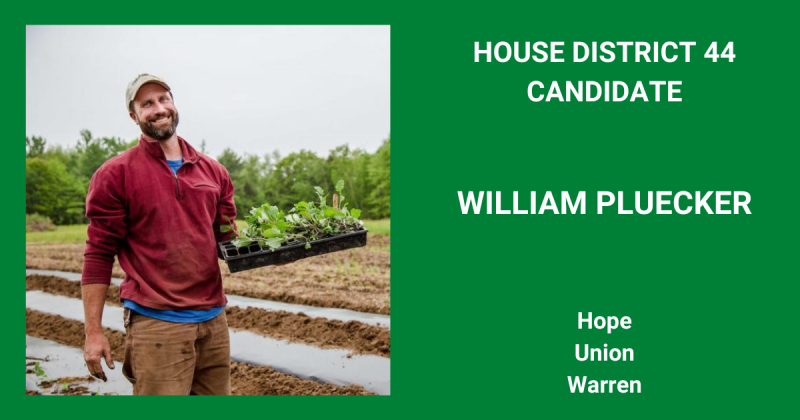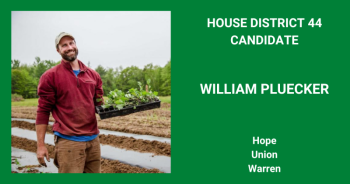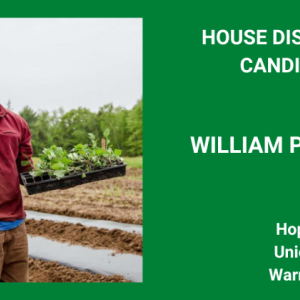On the issues: House District 44 candidate William Pluecker
Penobscot Bay Pilot has posed questions to each candidate running for Maine State Legislature, providing the opportunity for the public to better understand their position on issues important to the state. Candidates responding with their individual written answers will have their responses stored in the Pilot’s 2022 Election Resource Guide.
William Pluecker, an unenrolled political candidate, is seeking election to represent Maine House District 44, which includes Hope, Union and Warren. He is running against Crystal Robinson; read her questionnaire here.
Please provide a concise biography of yourself, and state why you are running for political office.
I have been growing vegetables, cows, and children on almost a hundred acres here on Finntown Road in Warren for 18 years now. We have transitioned the farm away from the Community Supported Agriculture model in the last two years to wholesale in an attempt to balance the needs of the Legislature and family. We sell primarily to the Good Shepherd Food bank through the Mainers Feeding Mainers program, but have also been selling vegetables into Rising Tide in Damariscotta and Good Tern in Rockport.
I have two children, my son, Eli, who will be turning 17 in October and is a Junior at Medomak Valley High School, and my daughter, CJ, 13, who is starting at Medomak Middle this coming September. I have worked to teach my kids the value of hard work and self-reliance on the farm. I have also taught them about being active members of our community, which I have modeled through active participation and leadership in our church, caring for our community through donating vegetables from the farm to local food pantries, and through our farm apprenticeship program where we have taught dozens of young farmers (many of whom have gone on to run their own businesses) the same values of self-reliance and hard work.
What are the three most pressing issues facing Maine, as a state, today, and how would you like to see them resolved?
We are heading into a hard winter for many people here in the district. The price of fuel for heating homes continues to soar. The price of food goes up, as do property taxes. We have a hard enough time making ends meet in our rural communities without these additional pressures. Of course, dealing with inflation is a complex issue that is not easily solved. I have worked hard in the Legislature to make sure that towns have the money that they need to keep property taxes low. The state is now fully funding their 55% of school costs as well as the 5% of municipal revenue sharing. We must continue these funding levels so that we can slow the pressure on towns to increase property taxes.
The cost of housing continues to go up as the supply dwindles. We need to increase supply and make sure that our older homes can be remodeled and made more efficient for winters. The state needs to continue to fund developments and reduce regulations that allow homes to be built.
Our small businesses are struggling with the labor shortage, which means we have a hard time doing the construction we need as well as run our economy. The state needs to run programs to encourage people to get back to work and help lower the cost of hiring people and make sure they have the education needed for the jobs we need them to fill.
Maine is grappling with a housing shortage, and legislation has been crafted — and passed last year — at the Maine Legislature to try and ease the situation by allowing greater density in all municipalities. Those municipalities now are analyzing this new state rule to understand how it applies to local zoning ordinances. Do you think this was an appropriate law to pass?
I did not support this law at the time it was going through the Legislature. It was a one size fits all attempt to increase housing that did not fit my rural district. I do believe that it had some policy ideas in it that would have helped expand the construction of housing in more densely settled municipalities and cities, but in our rural areas we did not have zoning laws or planning ordinances standing in our way to development.
My towns do not have extensive public water or sewer access. Increasing housing density at the end of dirt roads on land that cannot sustain it due to a lack of public utilities does not make sense, and the towns should be able to develop plans in a manner that make sense to them.
Do you have other ideas, and proposals, to help ease the housing problem?
There is a lack of housing in Maine, period. We need to subsidize the construction of homes. In an era of skyrocketing prices, the systems we use to help get people into housing are antiquated and not keeping up with rising costs. Those systems need an overhaul once we have the housing stock to supply those families.
We need to look at the housing stock and see how it is being utilized. If the homes we need are being held empty for the majority of the year so that they can be rented in the summer, the towns should take the lead in regulating those rentals in a way that makes sense for them.
What legislative committees would you like to serve on and why?
I have served the last four years on the Agriculture, Conservation, and Forestry Committee. I have been making my living from my farm for 18 years. I know the struggle of making one's living from the manual labor of one's own hands. Supporting small farms, ensuring our food supply, supporting our forestry economy, and protecting our land and water are all core to who I am as a person and the work I want to do in the Legislature.
I have also served the last two years on the Criminal Justice and Public Safety Committee. Representing the hard working men and women at the Maine State Prison and Bolduc Correctional is one of the greatest honors I have had in the Legislature.
Every session, I have put in bills to try to address the pay and benefits of our correctional staff and to address recruitment and retention issues there. They do amazing work that we all rely on despite the fact that it happens behind the walls. We expect professionalism from our staff, and we need to compensate them as professionals.
Maine’s economy relies on small and micro-businesses. How will you help the entrepreneur succeed in this state?
I am so lucky to have been part of the agricultural industry the last two decades. I have seen our small farms grow from struggling micro-businesses to vital pieces of our economy that bring young people here to work and start businesses, draw tourists, feed our citizens, and preserve our land. I believe this is a model that we can replicate in other industries in our state.
Small businesses are more nimble and able to innovate than large ones. Geographically, we are also in a difficult position, as we are at the end of the road when it comes to infrastructure and shipping costs. Creating businesses that can adapt quickly to changing conditions, that meet our needs locally, and can be marketed regionally are all key to our success as a state.
Business incubators and innovators should be encouraged with financial incentives. We should get regulations out of the way for growing small businesses, and the University of Maine should continue its excellent Research and Development work that supports so many natural resource based businesses.
What are the greatest economic, cultural and social strengths in your district, and how will you support them?
We are so lucky to be a rural district with a strong agricultural history and future. Growing up and working on farms teaches people resourcefulness, a willingness to work hard, and the common sense of how to make do with what you have. Those values are the social strengths that bind us together now and going forward.
We are also uniquely positioned to be a source of labor and lower cost space for the businesses that serve the growing municipalities on the coast. As we have seen with the recent news that Steel-Pro is moving to Union and bringing those jobs with them, our central location to the coast and central Maine, lower cost land compared to the immediate coast, and access to rural workers means that we have location and resources that employers are looking for.
We must continue to protect our rural character and land. There will continue to be development pressure put on our blueberry land, but preserving our agricultural land and values will make us unique in the future as others fail to hold on to it.
What are the greatest problems in your district, and how do you intend to address them?
As I discussed earlier, the nature of development in our district, the lack of housing, protecting our rural character, and rising costs.
We are dealing with competing factors as we see increasing needs for access to housing, but at the same time don't want to see our agricultural land lost to development. Making sure that homes aren't being built to stand empty most of the year is important, as is making sure that property taxes don't increase and make those homes and land unaffordable to the people who have lived in them for generations.
Supporting our farmers is key. If our open land is producing economic benefit to our community, then the pressure to build homes on productive fields is reduced. Active agriculture is key to protecting our land and rural character.
Do you support construction of the 145-mile Central Maine Power transmission line from Quebec to Massachusetts?
I have voted against it in the State House, and I believe the referendum from the people of Maine should be respected. The idea that foreign governments can come to Maine and spend millions of dollars and expect to overturn the democratically expressed will of the people is beyond the pale. We should not sell our land or our votes. They have the money, but that doesn't make them right. We voted. It is time they respect that vote.
The Maine Commission on Indigent Legal Services recently received funding from lawmakers to fund five public defenders to travel the state representing indigent defendants. Its executive director says that is “not a solution, it’s a patch" and that the agency needs an estimated $51 million to open public defender offices in all 16 counties. Should the Legislature be looking to fund more public defenders?
Maine is one of the only states in the country that subcontracts its public defender system. The right to representation in court is a constitutionally guaranteed right. If Maine does not fix our system that has been studied by independent third parties and found to be ineffective, we will be sued for not upholding those rights.
The Legislature has voted repeatedly to fund the Commission adequately, but it has not been put into the budget. We have a liability that will cost us even more the longer we go without addressing the issue. We must protect our Constitution and the rights it affords us. Any less is immoral, illegal, and weakens us as a state.
At least four county jails in Maine have combined to record nearly 1,000 phone calls between jailed defendants and their attorneys. What action would you like to see the Legislature and governor take to ensure this never again happens?
This issue was fundamentally about training and resources. We need to make sure our county Sheriff's Deputies are properly trained and have the resources to manage all outgoing calls. We have to pay to have someone overseeing the recording of calls so that the appropriate ones are recorded and the others are not.
The short staffing in our jails has resulted in staff not being fully trained for the duties assigned to them as well as having too much on their plate to ensure every task is done appropriately. As a state, we need to support the hard working men and women of our Sheriff's departments with the resources and training they deserve.
Maine is one of 16 states that does not offer parole after abolishing it in 1976. Should the state reinstate the possibility of parole?
A person who goes to prison and earns a bachelor's degree has a 1% chance of ending back up in prison. A person who goes to prison and earns a master's degree has a 0.1% or ending back up in prison. As a state, we are spending hundreds of thousands of dollars annually to incarcerate men and women who statistically will not break the law again. If it is the intent of our correctional system to rehabilitate, re-educate, and return people to society who will not commit a crime, we know how to do that.
To continue to pay for people's housing, food, health care, and security when they are no longer a danger to society makes no sense economically or ethically. The judge passed a verdict on the person who committed the crime, but decades after the crime, after programs and education, the person may have changed.
If a duly appointed parole board does its work and finds that they have passed the tests necessary to make professionals believe they are no longer a threat, why should we continue to spend our tax dollars on them? Yes, I believe the reinstatement of parole is the only choice if we believe in efficient, small government.
There is a statewide shortage of nurses willing to work at nursing homes and assisted living facilities. What more should the state be doing to attract workers?
The nursing shortage is nationwide, though we are feeling the pinch more than other states due to our older population. Nurses need to be paid well to do the difficult work that they do. This will attract more people to the profession and to the state. We already have a program to help new nurses cover their educational debts. This program should be expanded, made easier to apply for, and advertised.
What is your position on abortion?
The choice of whether to abort a pregnancy is not one that any person wants to be put in the position of making. I do not want to put any person in the position of choosing abortion, nevertheless, I have always supported medical freedom and the right of any person to make choices for their own body.
The direction some states are going of forcing women to carry pregnancies to term in the case of rape or incest, or being forced to make the choice between their own health and the pregnancy, are not ones that I feel, as a government representative, I can make for them.
I do not want any one telling me what medical choices to make for myself, my daughter, or anyone in my community, so I fully support the power of people to make their own choices when it comes to abortion.
The Maine Dept. of Transportation is focusing more on active transportation (bike and pedestrian, as well as public transportation). How would you like to see this implemented in your district?
In rural districts, biking and walking are not great ways to get to work. We need to focus on ways to help the regular commuters get to work, which can help our staffing shortages. We also need systems to help older Mainers who are no longer driving get to doctor's appointments and run errands. MaineCare provides medical transportation ,and soon some older Mainers and adults with disabilities should be receiving transportation for non-medical trips.
Targeted transportation that meets real needs should be our priority.
What is your position on Gov. Janet Mills' energy policy?
As a state, in the current energy environment, it would be a huge boon to be energy independent. Solar energy can help this cause, but we must protect our agricultural and conservation lands from development. Losing our ability to produce food has long term consequences beyond the 40 year life span of a solar array.
There are great places for solar development, on contaminated land, on rooftops, and near buildings. The state needs to move forward with a plan to conserve our agricultural and food producing land as we head into a century with increasing supply chain issues, drought, storms, and food shortages
If a voter expressed concern to you about voting security in Maine, how would you respond?
In Maine, all of our votes are backed up with paper copies of ballots. This is key to being able to go back and audit any voting irregularities. We have many systems of checks and double checks to ensure the validity of our democratic process. Maine has one of the most secure systems in the country, and we should be proud of that.
What is your position on gun control?
I support our constitution and the Second Amendment. I believe guns are tools on farms and for hunting. We also need to look at the role of gun violence in our state. We have been blessed with not having a mass shooting in our state, but we continue to have serious issues with guns used in suicide and domestic violence assaults. Protecting our rural way of life means having access to firearms and doing so in a responsible law-abiding manner.
What is your vision of Maine in 20 years?
I expect that development pressure will continue for the next 20 years as we see the droughts in the West continue. As the cost of living continues to increase in the cities, people will continue to look to Maine as an affordable place to escape to. We will need to put serious resources behind our housing issues in order to deal with those pressures.
The good news is that some of these new residents will help us to address our labor issues, but only if we find places to house them. Maine will continue our progress on addressing climate change and using our natural resource economy to innovate new ways for economic and environmentally sustainable development.
At the same time, we must make space for the development pressures from these newcomers and also protect the rural character of our small towns and our way of life through conservation, technical education of our youth, and preserving our agricultural land.
Free space! Is there anything else you want voters to know about you or your vision not addressed through this questionnaire?
The job of State Representative is about representing people, not about party loyalty, or ideological purity. Every election cycle is a long-term job interview, talking to my future bosses so that they know I am capable of doing the job they are asking of me. I am not doing this job for myself or any political party.
I am doing this job for the people who are hiring me, the people of my District. I am here to make sure I am doing the best job representing them in the State House that I can. I appreciate the faith you have put in me so far, and I hope you'll hire me back for another term on November 8.


























